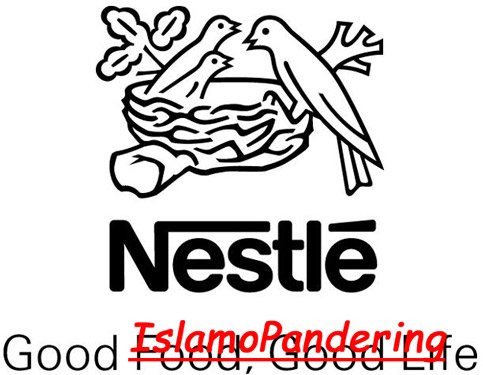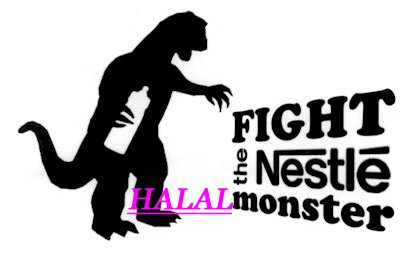November 18, 2009, - 1:23 pm
Quote of the Day: Enjoy That Halal Nestle Bar
Twenty percent of the world’s population is going to be Muslim one day and they have expectations, they have needs.
— Frits van Dijk, executive vice president of Nestle, the world’s biggest food group AND the world’s leading manufacturer of halal food. (No relation to Dick van Dijk that we know of.)

Yeah, “needs” like four wives and a taste for Jewish and Christian infidel blood a la the Fort Hood massacre.
Sadly, those “expectations and needs,” as we all know, have gone well beyond the kitchen and the meal and into restricting the lives and lifestyles of non-Muslim westerners, as well as our foreign policy.
I don’t have a problem with companies doing things–within reason–to expand their customer base for products. But what frightens me is when their behavior translates into political and public sectors, as it has with Islam, and when the behavior goes beyond a phony, meaningless halal symbol on the side of the box.
And when Western politicians start saying things like the Nestle Europe EVP, it’s frightening. Sadly, they haven’t just started. It’s already been going on for years (remember George W. Bush besting Al Gore for the Islamic endorsement because he opposed profiling of Islamic terrorists during a 2000 Presidential debate?). When the $634 billion halal industry starts buying foreign policy–and that’s long ago begun–then we’re in trouble. And we are, indeed, in trouble.
Then, there are the products. Alcohol-based flavorings (sometimes used in chocolate), for example, might be eliminated to appease Muslim buyers. Halalism’s effect is not just in another country far away in the Middle East, it’s on your tongue.
And “halal candy bars” is a fraudulent term. It’s a sign that Islam, in fact, as I’ve warned for over a decade, continues to move to the far right extremism of Saudi Arabia and Iran. And, unlike keeping kosher, Islamic dietary rules (what is “halal” or “permitted”) were heretofore quite lax. You don’t have to be an imam to know that, as a Muslim, you really don’t need a halal symbol to eat a candy bar . . . even if you’re the most devout Muslim on earth. (And that’s not even counting the mass fraud regarding halal certification on chicken and other animals that need halal slaughter–a rip-off of kosher slaughtering, though not as strict.)
But Muslims–in continuing to emulate the Jews they so hate–want to get a piece of the religious dietary certification market. And they’re basically using blackmail and their growing numbers in Europe to get paid for the sham halal certification of non-animal products. And the first to give in and pander halal-style on a continent-wide European scale is Nestle.
The thing is, as I’ve noted on this site in the past, Nestle is usually on the Muslim boycott list because Nestle owns a big stake in Elite–the Israeli chocolate and candy company–and therefore does business with and in Israel. That’s not to say the Muslims are ever consistent in their food choices or whining anti-Israel boycotts, as Sabra–the Israeli brand of hummus–is the most popular brand of hummus in the Middle East, and that includes the Muslim nation majority. (Though I wouldn’t be surprised if, ultimately, Nestle sells its stake in Elite and stops dealing with Israel, in its whoring out to halal consumers. Dollars are more important than principle to people like Mr. Van Dijk.)
It’s like the “Jew lawyer” thing I always encounter from Muslims wanting to hire an attorney. They always tell me they want “the best,” and ignorantly hold onto the stereotype that “the best attorney” is a Jew. They often prefer a Jewish lawyer to a Muslim one, even though they’d slit the Jewish lawyer’s throat in a heartbeat if they could get away with it . . . after he/she won the case for them.

More:
The business of selling food that is halal, or acceptable to Muslims, is set to grow rapidly in Europe in coming years as more supermarket chains target the sector, a Nestle executive said on Tuesday.
Frits van Dijk, executive vice president at the world’s biggest food group, told Reuters on the sidelines of the World Halal Forum in The Hague he expected the halal food business in Europe to grow by 20 to 25 percent within the next decade.
The total European halal food market is currently valued at about $66 billion, including meat, fresh food and packed food, while the global market is worth about $634 billion.
“We are starting to see that these products are not just in specialty shops but are also starting to get into the mainstream of modern retailers,” said Van Dijk, pointing to Britain’s Tesco and France’s Carrefour, which stock halal goods. . . .
Milk powder, cooking aids, seasoning and sauces are among the most popular halal products in Europe at the moment, while Nestle has recently started selling a range of meat-based and frozen food halal products in France, Van Dijk said.
Nestle is the world’s leading manufacturer of halal food, selling about 5.3 billion Swiss francs ($5.23 billion) worth of halal food in 2008, about 5 percent of its annual revenue.
Its established halal food markets include Malaysia, Indonesia, Turkey and Middle Eastern countries, while France, Britain and Germany are emerging as its key halal markets in Europe.
And I predict that the U.S. is on this list in a year or two, if not already. This isn’t about food. It’s about population. And we’re losing that battle–centimeter by centimeter–with Muslims, as we continue to allow them to emigrate and mass reproduce and radicalize on our soil.
“Twenty percent of the world’s population is going to be Muslim one day and they have expectations, they have needs,” said Van Dijk.
“If they want to be confident that what they eat and drink is in line with their beliefs, then a company likes ours has to make an extra effort to try and meet those needs.”
The scare thing is that politicians and bureaucrats want to be confident that what they do is in line with the halal food consumers’ beliefs, too. And, as we know, they’re already making the extra effort to meet those needs. Just ask the family members of Nidal Malik Hasan’s victims.
About 85 of Nestle’s 456 factories globally are now halal-certified but Van Dijk said different interpretations of halal standards around the world were a challenge for the industry.
Muslim jurists do not always agree on what is halal. Islam prohibits the consumption of pork and prescribes how animals must be slaughtered, but there has been debate on the acceptability of non-alcoholic beer, collagen and vinegar.
The Organization of the Islamic Conference (OIC) is working on a single standard to be applied in its 57 member countries, a move that would boost the industry, although politics and varied interpretations may complicate the task.
Van Dijk said the industry needed more transparency and clearer labeling on products would help consumers make up their own minds about whether standards met their expectations.
Don’t kid yourself. Van Dijk doesn’t care if the standards met our expectations, just those of the growing Islamic population of his markets.
Sadly, as goes food, so goes the West. Like I said, this really isn’t a battle for stomachs, it’s a pandering to religions . . . one religion in particular that has little tolerance for all others.
Think about that the next time you eat that (halal) Nestle Crunch bar.
Tags: Elite, Frits Van Dijk, halal, Islam, Israel, Muslims, Nestle


The difference is Jews have never sought to impose kosher on non-Jews. On the other hand, Muslims want to impose their rules including their dietary rules on the rest of us. “Halal” is as sincere as Islamic “modesty.” Pity the businessman who has to pander to the Islamofrauds.
NormanF on November 18, 2009 at 1:36 pm